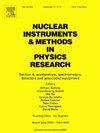Efficient modeling of structure-based wakefield accelerators via separated representations
IF 1.5
3区 物理与天体物理
Q3 INSTRUMENTS & INSTRUMENTATION
Nuclear Instruments & Methods in Physics Research Section A-accelerators Spectrometers Detectors and Associated Equipment
Pub Date : 2025-02-13
DOI:10.1016/j.nima.2025.170292
引用次数: 0
Abstract
Structure-based wakefield accelerators (SWFA) promise orders of magnitude improvements in accelerating gradient over conventional approaches and have been identified as a candidate technology for future applications ranging from compact free electron lasers to multi-TeV lepton colliders. However, achieving the desired beam energy and quality can require meter-scale structures with tight tolerances, introducing new constraints on structure and beam characteristics to minimize emittance growth and combat transverse instabilities. High fidelity and self-consistent simulations of high brightness beams over these lengths necessitate enormous computational resources, making parametric studies of novel structures or instability-mitigation schemes unfeasible with standard practices. We present a technique for decomposing high dimensional wakefield systems into a set of lower dimensional components, capable of accurately reconstructing the structure response in a fraction of the time. We discuss the approach and implementation of this technique using Green’s Functions for common structure geometries. We demonstrate the potential for significant reduction in computation times and memory footprint using such representations, with extensions to higher dimensions.
与传统方法相比,基于结构的汪场加速器(SWFA)有望在加速梯度方面实现数量级的改进,并已被确定为未来应用(从紧凑型自由电子激光器到多TeV轻子对撞机)的候选技术。然而,要达到所需的光束能量和质量,需要具有严格公差的米级结构,这就对结构和光束特性提出了新的限制,以最大限度地减少发射增长并消除横向不稳定性。对这些长度的高亮度光束进行高保真和自洽性模拟需要大量的计算资源,这使得对新型结构或不稳定性缓解方案进行参数研究的标准做法变得不可行。我们提出了一种将高维若场系统分解为一组低维分量的技术,能够在极短的时间内准确重建结构响应。我们讨论了使用常见结构几何形状的格林函数的方法和该技术的实施。我们展示了使用这种表示方法显著减少计算时间和内存占用的潜力,并可扩展到更高维度。
本文章由计算机程序翻译,如有差异,请以英文原文为准。
求助全文
约1分钟内获得全文
求助全文
来源期刊
CiteScore
3.20
自引率
21.40%
发文量
787
审稿时长
1 months
期刊介绍:
Section A of Nuclear Instruments and Methods in Physics Research publishes papers on design, manufacturing and performance of scientific instruments with an emphasis on large scale facilities. This includes the development of particle accelerators, ion sources, beam transport systems and target arrangements as well as the use of secondary phenomena such as synchrotron radiation and free electron lasers. It also includes all types of instrumentation for the detection and spectrometry of radiations from high energy processes and nuclear decays, as well as instrumentation for experiments at nuclear reactors. Specialized electronics for nuclear and other types of spectrometry as well as computerization of measurements and control systems in this area also find their place in the A section.
Theoretical as well as experimental papers are accepted.

 求助内容:
求助内容: 应助结果提醒方式:
应助结果提醒方式:


